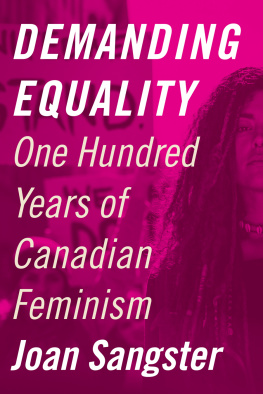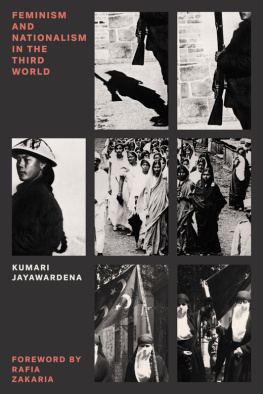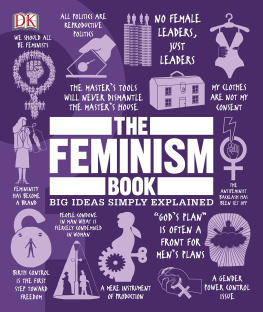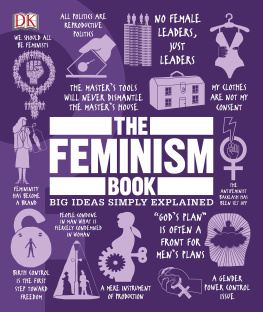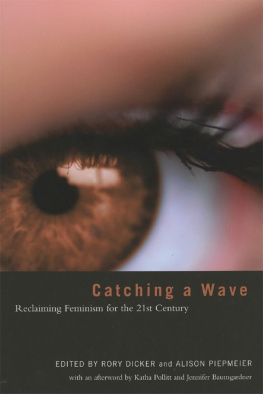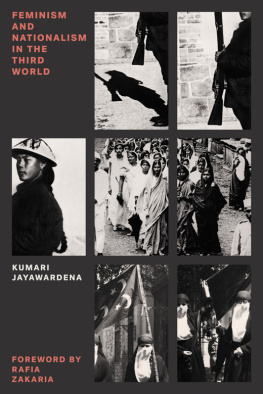The Dinner Party


SERIES EDITORS
Claire Potter, Wesleyan University
Renee Romano, Oberlin College
ADVISORY BOARD
Mary Dudziak, University of Southern California
Devin Fergus, Hunter College, City University of New York
David Greenberg, Rutgers University
Shane Hamilton, University of Georgia
Jennifer Mittelstadt, Rutgers University
Stephen Pitti, Yale University
Robert Self, Brown University
Siva Vaidhyanathan, University of Virginia
Judy Wu, Ohio State University
The Dinner Party
Judy Chicago and the Power of Popular Feminism, 19702007
JANE F. GERHARD

2013 by the University of Georgia Press
Athens, Georgia 30602
www.ugapress.org
All rights reserved
Set in Minion Pro and Myriad Pro by Graphic Composition, Inc.
Manufactured by Thomson-Shore, Inc.
The paper in this book meets the guidelines for
permanence and durability of the Committee on
Production Guidelines for Book Longevity of the
Council on Library Resources.
Printed in the United States of America
17 16 15 14 13 P 5 4 3 2 1
Library of Congress Cataloging-in-Publication Data
Gerhard, Jane F.
The Dinner Party : Judy Chicago and the Power of Popular Feminism,
19702007 / Jane F. Gerhard.
pages cm. (Since 1970: Histories of contemporary America)
Includes bibliographical references and index.
ISBN 978-0-8203-3675-6 (hardcover : alk. paper) ISBN 0-8203-3675-0
(hardcover : alk. paper) ISBN 978-0-8203-4457-7 (pbk. : alk. paper
ISBN 0-8203-4457-5 (pbk. : alk. paper)
1. Chicago, Judy, 1939Dinner party. 2. Chicago, Judy, 1939 Criticism
and interpretation. 3. FeminismUnited States. I. Title.
NK4605.5.U63C482 2013
709.2dc23
2012043503
British Library Cataloging-in-Publication Data available
ISBN for digital edition: 978-0-8203-4568-0
Acknowledgments
I CANT SAY THAT The Dinner Party taught me that my vagina had a history, a politics, or even a collective to join. That honor falls to Anne Koedt, author of the 1970 The Myth of the Vaginal Orgasm and muse of my first book, Desiring Revolution. But studying the art and writings of Judy Chicago and then meeting her did teach me many things and for that reason, my first acknowledgment goes to her. I met the artist in 2009 at her home in Belen, New Mexico, where she opened her memories and archives to me with characteristic generosity. I interviewed her four times in a two-year period and regularly corresponded to double-check facts. After our first meeting, Judy grinned at me and said in a low voice, It got you. The Dinner Party got you. She had seen it happen before and she was right. With that credential clearly established, Chicago sent me materials she had not yet chosen to archive with her papers at the Schlesinger Library, particularly the financial side of The Dinner Partys history. She has been an avid supporter of this book, and for this and for all her help, and the help of her husband, photographer Donald Woodman, I offer a heartfelt thank-you. But my gratitude to Judy stretches beyond my vested interest in my own book. I take inspiration from the way she has lived her life, both as an artist and a person of integrity. Although she faced tremendous obstacles, she never let them stop her, and so has become a role model for me as I face new challenges in my life. I also want to thank her for being that ballsy (so to speak) radical feminist in 1970 who demanded that women reclaim their bodies, their destinies, and a right to a different kind of history. This book is a tribute to that big bang of radicalism we historians call second-wave feminism. Thank you, Judy Chicago, for being a feminist.
I also want to thank the women of The Dinner Party who took time out of their busy lives to remember, once again, those heady days of working at the studio against crazy deadlines and seemingly insurmountable odds. In the course of writing this book I met with Susan Hill and Diane Gelon numerous times; Susan sent detailed comments on the section of the manuscript that involved the loft and the technical details of embroidery, and Diane helped me understand the crazy finances of the studio; these conversations proved extremely useful and I am very grateful for their willingness to talk to me and their insistence that I get the details right. A warm thanks to Kate Armand, Ruth Askey, Jan Marie DuBois, Audrey Cowan, Johanna Demetrakas, Ken Gilliam, Shannon Hogan, Ann Isolde, and Juliet Meyers, who individually and collectively (what a night that was!) cast light on the transformative experience of working on The Dinner Party. A special shout-out to Ann Isolde, who sent me excerpts from her personal diary and shared her recollections of researching the Heritage Floor and to Juliet Meyers for her honesty and willingness to say what others would not. Mary Ross Taylor talked with me on the phone, regaling me with Through the Flower stories and her razor-sharp interpretations and then sent me envelopes stuffed with information from the Houston exhibit and the 1990 congressional debates over arts funding. Cleveland organizers Mickey Stern and Marcia Levine spoke to me over the phone to tell me about their journeys to, through and away from The Dinner Party. Ann T. Mackin sent me Values in Voices: Judy Chicagos The Dinner Party, Cleveland Exhibit, May 10August 9, 1981, The Audiences Speak (2006), her masters thesis at Ursuline College, and her raw data on the Cleveland comment book. I emailed with April Harkins about the Boston show, Ellen Strong and Jeanne Van Atta about the Cleveland show, and met with Meri Jenkins, wife of Peter Bunzick, about the trials of traveling with The Dinner Party in the 1980s. I also corresponded with Debra Hirshberg, Jill Fields, Suzanne Lacy, Mira Schor, Faith Wilding, Amelia Jones, Di Robson, and Gretchen Mieszkowski. Many thanks to you all for your good help and for helping to set me straight. Any mistakes that remain are mine and mine alone.
This book was written with two readers in mind. The first, Mari Jo Buhle, trained me in the art of history writing and gave me a taste for the complexity of the past. She brought a feminist-inspired culture to her work with graduate students, teaching us to work hard, plot our own courses, and to never base our successes on tearing one another down. She was the reluctant pack leader to generations of ambitious and competitive offspring, ever calm and assertive (on the surface, at least), presciently suggesting that in some distant future we would see one another as dear friends, not as irritating seminar competition. She was absolutely right. In addition, and even more importantly, she gave me a feel for the 1970s with her careful reading of my work over the years. She once called me her BFF, and if its true, its definitely one of my most awesome accomplishments ever.
The second person I kept in my mind as I wrote is Maia Brumberg-Kraus. She is whip-smart and unschooled in feminist historiography and so a perfect imagined audience for me. When, to quote a Dinner Party studio volunteer, I would get lost in the abyss of The Dinner Party
Next page

